牛津深圳版英语七年级上册Module 1 My life Unit 2 Daily life-Vocabulary课件(共36张PPT)
文档属性
| 名称 | 牛津深圳版英语七年级上册Module 1 My life Unit 2 Daily life-Vocabulary课件(共36张PPT) | 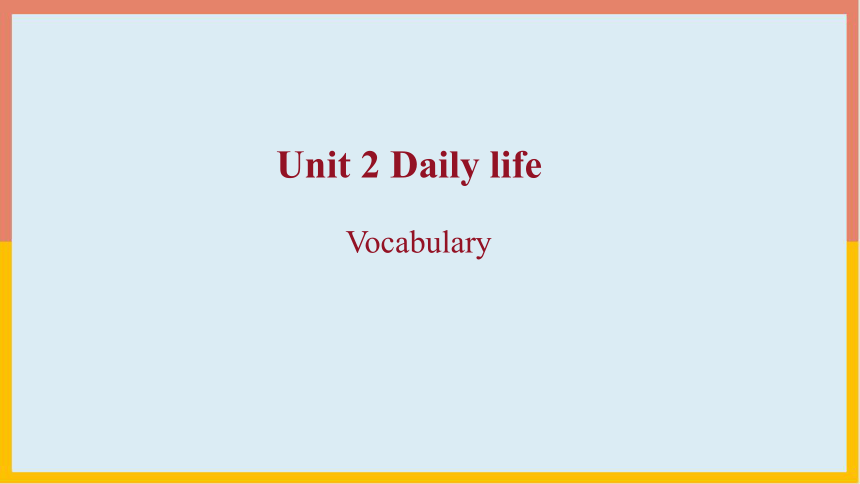 | |
| 格式 | pptx | ||
| 文件大小 | 4.4MB | ||
| 资源类型 | 教案 | ||
| 版本资源 | 牛津深圳版 | ||
| 科目 | 英语 | ||
| 更新时间 | 2022-11-18 23:27:20 | ||
图片预览

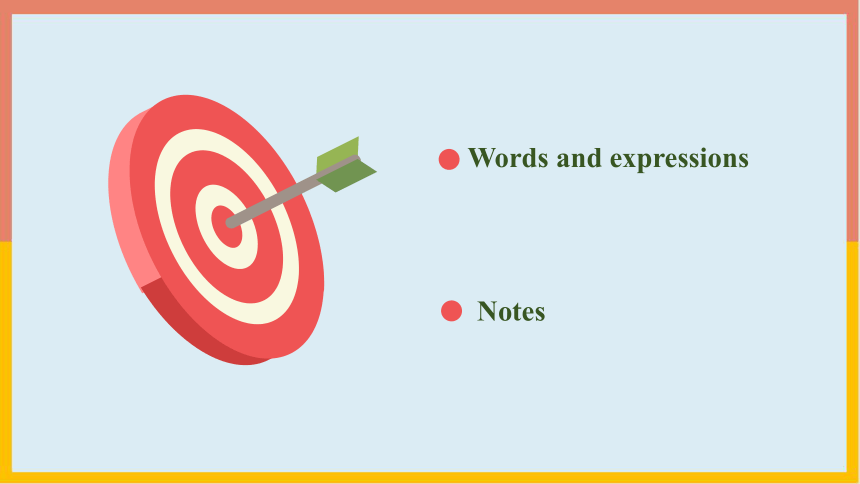
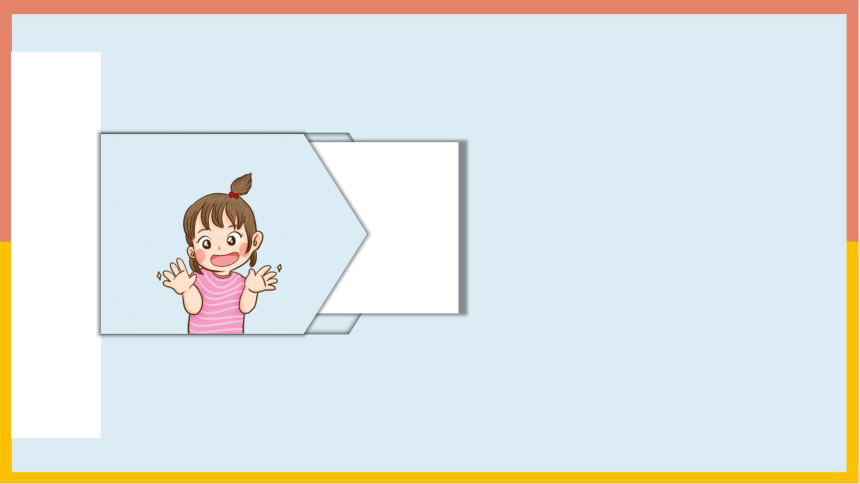
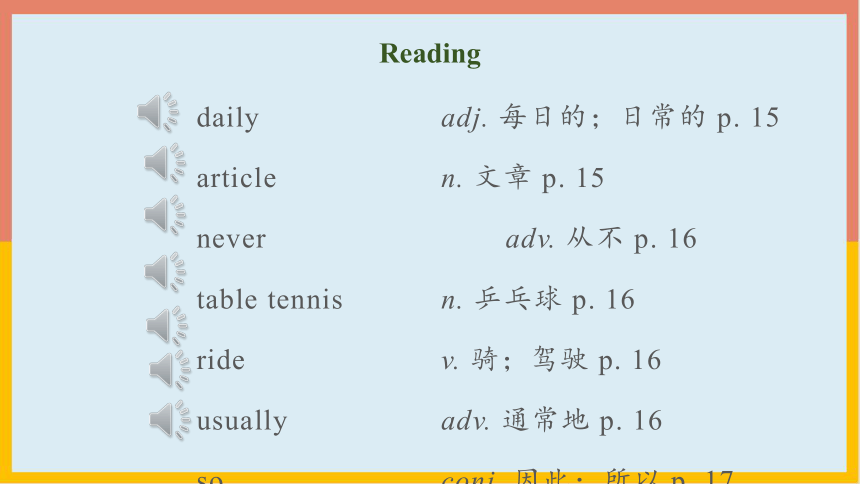
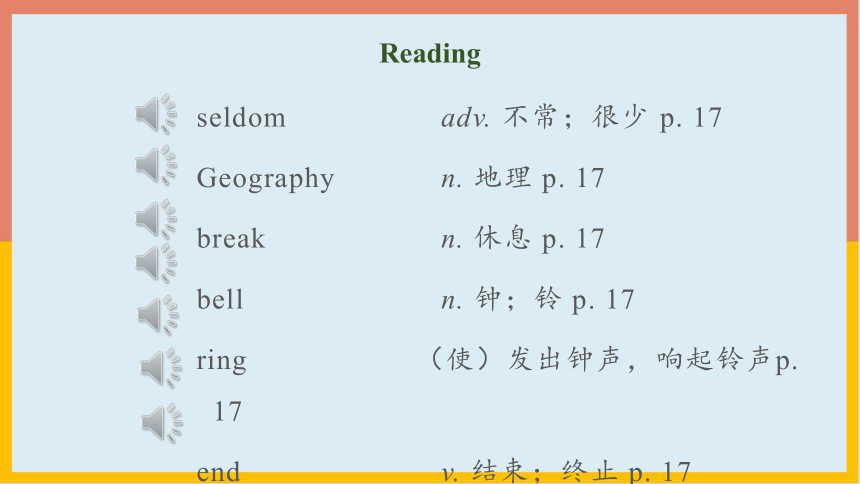
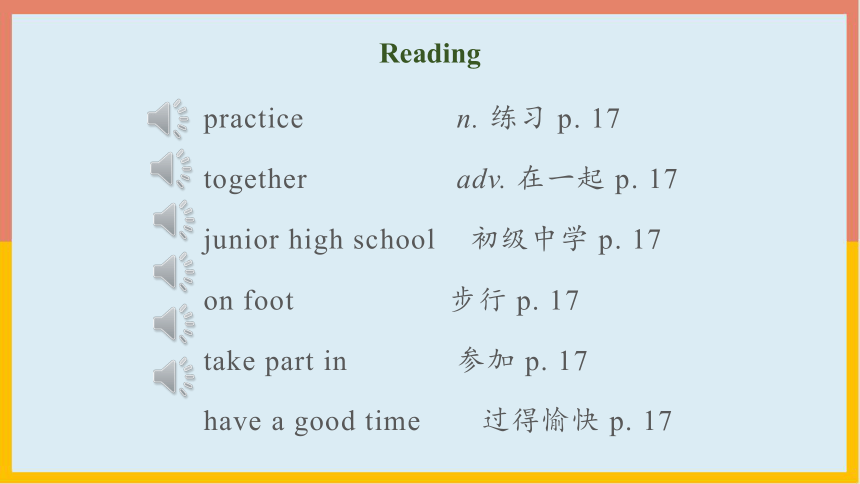
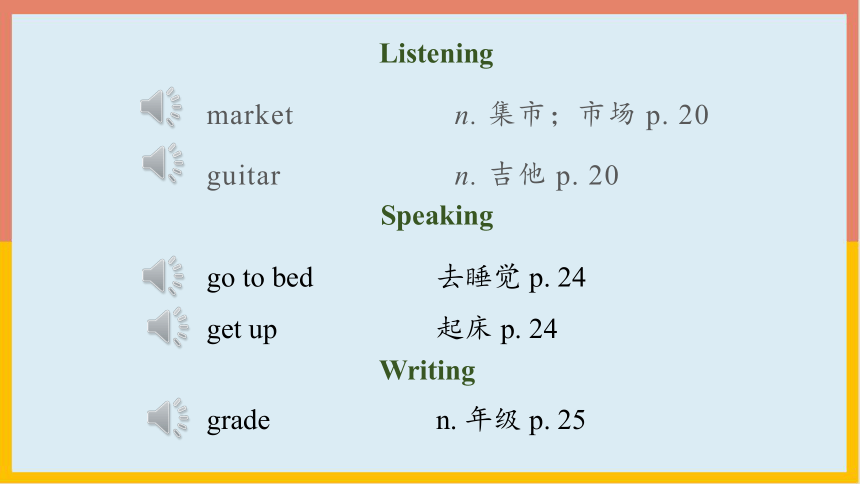
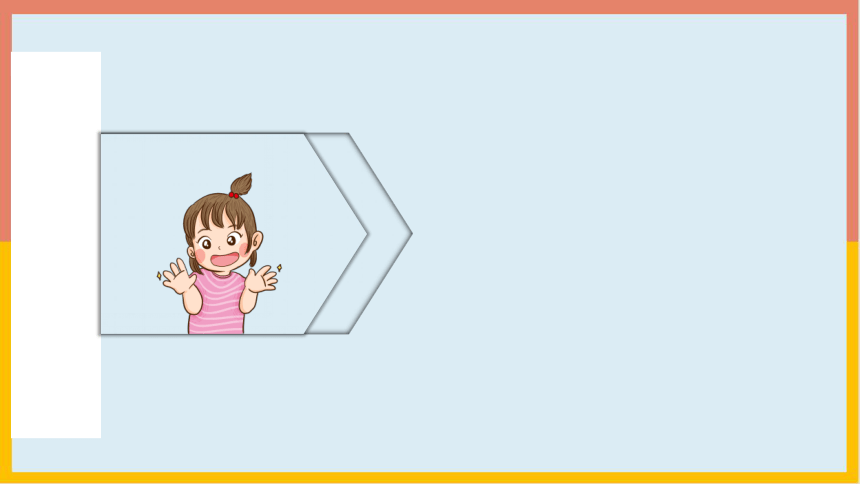
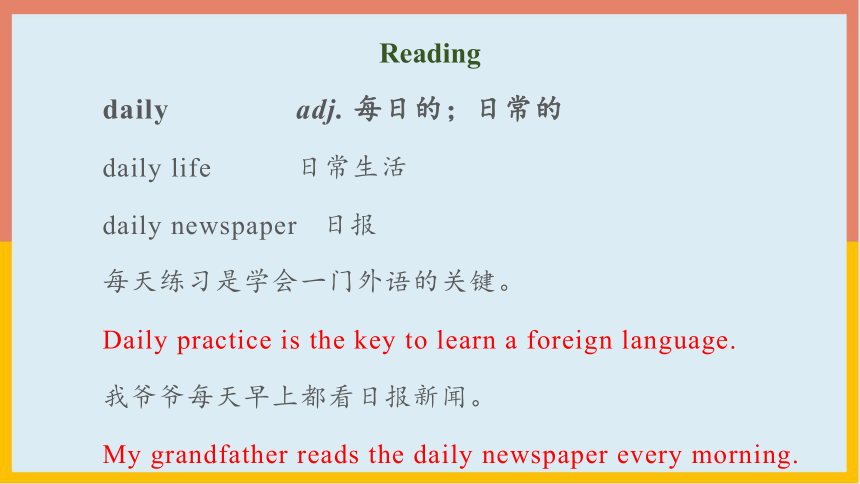
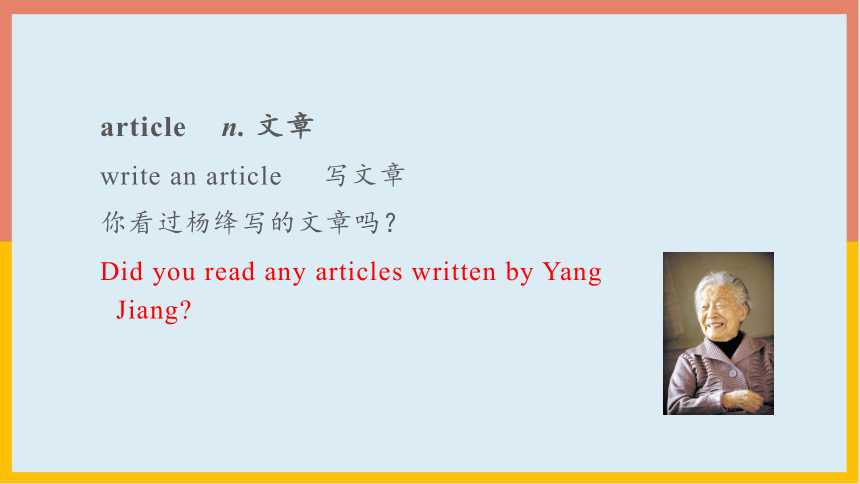
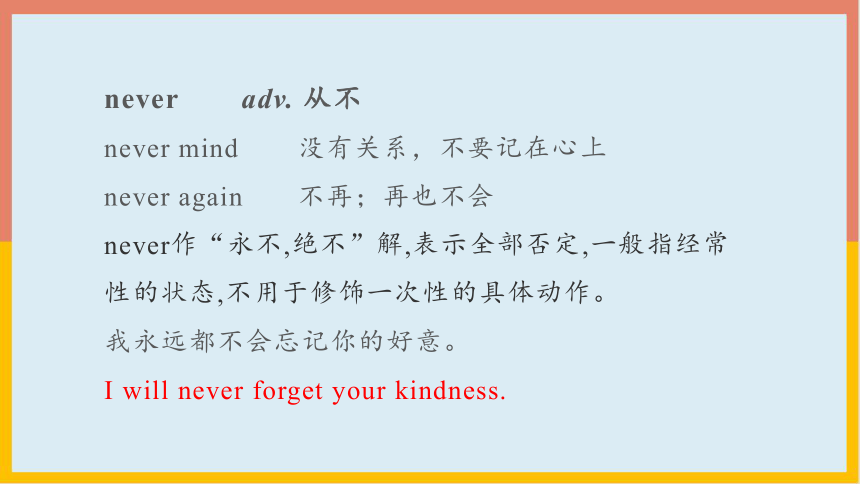
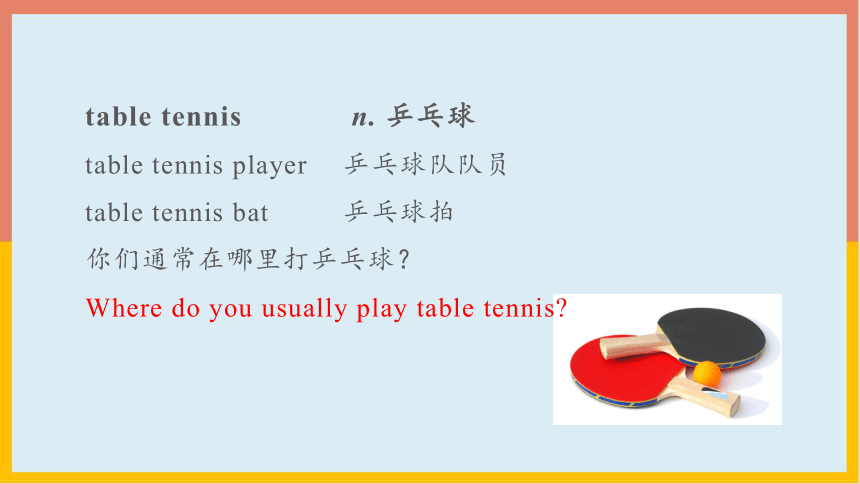
文档简介
(共36张PPT)
Vocabulary
Unit 2 Daily life
Words and expressions
Notes
Words and expressions
daily adj. 每日的;日常的 p. 15
article n. 文章 p. 15
never adv. 从不 p. 16
table tennis n. 乒乓球 p. 16
ride v. 骑;驾驶 p. 16
usually adv. 通常地 p. 16
so conj. 因此;所以 p. 17
Reading
seldom adv. 不常;很少 p. 17
Geography n. 地理 p. 17
break n. 休息 p. 17
bell n. 钟;铃 p. 17
ring (使)发出钟声,响起铃声p. 17
end v. 结束;终止 p. 17
band n. 乐队 p. 17
Reading
practice n. 练习 p. 17
together adv. 在一起 p. 17
junior high school 初级中学 p. 17
on foot 步行 p. 17
take part in 参加 p. 17
have a good time 过得愉快 p. 17
Reading
market n. 集市;市场 p. 20
guitar n. 吉他 p. 20
go to bed 去睡觉 p. 24
get up 起床 p. 24
grade n. 年级 p. 25
Listening
Speaking
Writing
Notes
daily adj. 每日的;日常的
daily life 日常生活
daily newspaper 日报
每天练习是学会一门外语的关键。
Daily practice is the key to learn a foreign language.
我爷爷每天早上都看日报新闻。
My grandfather reads the daily newspaper every morning.
Reading
article n. 文章
write an article 写文章
你看过杨绛写的文章吗?
Did you read any articles written by Yang Jiang
never adv. 从不
never mind 没有关系,不要记在心上
never again 不再;再也不会
never作“永不,绝不”解,表示全部否定,一般指经常性的状态,不用于修饰一次性的具体动作。
我永远都不会忘记你的好意。
I will never forget your kindness.
table tennis n. 乒乓球
table tennis player 乒乓球队队员
table tennis bat 乒乓球拍
你们通常在哪里打乒乓球?
Where do you usually play table tennis
ride v. 骑;驾驶
ride a horse 和 ride a bicycle 一般强调“骑”的动作,而
ride on a horse 和 ride on a bicycle 则强调“骑”的状态。
他骑着一匹白马而来。
He came riding on a white hors.
你能骑马吗?
Can you ride a horse
drive 和ride 的比较:
两者都属于不及物动词。
drive 表示“乘坐完全或部分地属于自己管理的车。
ride 表示“乘坐不是自己管理的车”。
美国人还将 ride 用于表示“乘船”。
两者作名词时,有类似的不同点。
usually adv. 通常地
usually是频度副词,意思是“常常”“习惯于”,
有遵循常规的意思,其经常性约为90%。
你下班以后,通常都做些什么
What do you usually do after work
我们通常开汽车去旅游。
We usually go travelling by car.
so conj. 因此;所以
so on 等等
so much 这么;非常;达到这种程度
so far 到目前为止
外面在下大雪,所以我不能出去玩。
It was snowing heavily outside, so I could not go out to play.
我的自行车坏了, 因此我得走路了。
My cycle is broken, so I shall have to walk.
seldom adv. 不常;很少
seldom 是频度副词,意思是“很少,罕见,难得”。
seldom 具有否定意味,在句中一般位于系动词、情态动词、助动词之后、实义动词之前,用于句首表示强调时,要主谓部分倒装。
星期天他很少在家。
On Sundays, he seldom stays at home.
晚上我很少出去。
I seldom go out at night.
Geography n. 地理
geography 的基本意思是“地理学”,是不可数名词,其前一般不加冠词。
新的地理老师怎么样?
How's the new geography teacher
我们在上地理课的时候用地球仪。
We use a globe in our geography lessons.
break n. 休息
break 用作名词的基本意思是“裂口,裂缝; 破裂”,
用于时间可表示“间歇,休息时间”,也可指旧方式
或生活习惯的“改变”或“中断”,是可数名词。
break 作“休息”解时是不可数名词,用作单数形式需加不定冠词。
课间有十分钟休息时间。
There is a ten-minute break between the classes.
bell n. 钟;铃
bell 的基本意思是“钟”“铃”,多指由金属制成的响器, 此外还可指电铃、车铃等,其形状不一,为可数名词。
ring the bell 鸣钟;按门铃
alarm bell 警钟;警铃
他听见学校的铃声响了。
He heard the school bell ring.
ring v. (使)发出钟声,响起铃声
ring the bell 按门铃
ring 的基本意思是指金属物品受碰撞时发出声响
或时钟定时报响,即“鸣响”。引申可指“打电话”等。
教堂的钟声响起来了。
The church bells are ringing.
end v. 结束;终止
end的基本意思是“结束”,通常指某一发展过程的最终结束。
end in sth. 以……结尾
他们决定断绝关系。
The decided to end their relationship.
比赛结果是平局。
The contest ended in draw.
band n. 乐队
band 作“乐队 ”“人群,团伙”解时是集合名词用作主语时如着眼于整个的“队,群”,谓语动词用单数形式;如着眼于队、群中的成员,则谓语动词用复数形式。bands 则指多个乐队或多个团伙。
他们是一支由五名男孩组成的少年演唱队。
They are a teenager band made up of five boys.
practice n. 练习
practice 的基本意思是“练习,实习”,指为了求得完善或达到熟练而有规则地反复地做某事,可用作可数名词,也可用作不可数名词。practice作“实践,实际”解时是不可数名词。
要弹好钢琴需要进行大量的练习。
It takes a lot of practice to play the piano well.
together adv. 在一起
get together 聚会;聚集;收集;积累
all together 一起,一道;同时
我们家人经常在一起吃饭。
Our family usually has dinner together.
很高兴我们终于取得了一致。
I am glad we have come together at last.
junior high school 初级中学
你初中最美好的记忆是什么
What is your best memory from junior high school
on foot 步行
他上学不是乘公共汽车,而是走路。
He goes to school not by bus, but on foot.
take part in 参加
take part in 指参加群众性活动、会议、劳动、游行等,往往指参加者持有积极的态度。有时可与join in 互换使用。
你会参加英语演讲大赛吗?
Will you take part in the English speech contest
我们应该积极参加学校的活动。
We should take an active part in school activities.
have a good time 过得愉快
have a good time (in) doing sth. 表示“做某事很开心”。
上个月你在香港迪士尼乐园玩得开心吗?
Did you have a good time in Hong Kong Disney last month?
market n. 集市;市场
market 作“集市,市场”解,是可数名词; 作“行
情”解,常用单数形式。
我们在市场买了水果和蔬菜。
We bought fruit and vegetables at the market.
Listening
guitar n. 吉他
play the guitar 弹吉他,玩吉他
guitar player 吉他手
弹吉他很好玩。
It is fun to play the guitar.
他的吉他弹得和你一样好。
He plays the guitar as well as you.
go to bed 去睡觉
我通常十点半睡觉。
I usually go to bed at half past ten.
get up 起床
我不习惯很早起床。
I'm not used to getting up early.
Speaking
grade n. 年级
first grade 一年级
grade 在美式英语中,用以指(中小学的)“年级”,相
当于英式英语中的 form 和 standard 。
萨姆在小学一年级一班。
Sam is in the first grade class one.
Writing
Dictation
每日的;日常的
文章
从不
乒乓球
骑;驾驶
通常地
因此;所以
不常;很少
地理
休息
daily
article
neve
table tennis
ride
usually
so
seldom
Geography
break
钟;铃
(使)发出钟声,响起铃声
结束;终止
乐队
练习
在一起
初级中学
步行
参加
过得愉快
bell
ring
end
band
practice
together
junior high school
on foot
take part in
have a good time
集市;市场
吉他
去睡觉
起床
年级
market
guitar
go to bed
get up
grade
Vocabulary
Unit 2 Daily life
Words and expressions
Notes
Words and expressions
daily adj. 每日的;日常的 p. 15
article n. 文章 p. 15
never adv. 从不 p. 16
table tennis n. 乒乓球 p. 16
ride v. 骑;驾驶 p. 16
usually adv. 通常地 p. 16
so conj. 因此;所以 p. 17
Reading
seldom adv. 不常;很少 p. 17
Geography n. 地理 p. 17
break n. 休息 p. 17
bell n. 钟;铃 p. 17
ring (使)发出钟声,响起铃声p. 17
end v. 结束;终止 p. 17
band n. 乐队 p. 17
Reading
practice n. 练习 p. 17
together adv. 在一起 p. 17
junior high school 初级中学 p. 17
on foot 步行 p. 17
take part in 参加 p. 17
have a good time 过得愉快 p. 17
Reading
market n. 集市;市场 p. 20
guitar n. 吉他 p. 20
go to bed 去睡觉 p. 24
get up 起床 p. 24
grade n. 年级 p. 25
Listening
Speaking
Writing
Notes
daily adj. 每日的;日常的
daily life 日常生活
daily newspaper 日报
每天练习是学会一门外语的关键。
Daily practice is the key to learn a foreign language.
我爷爷每天早上都看日报新闻。
My grandfather reads the daily newspaper every morning.
Reading
article n. 文章
write an article 写文章
你看过杨绛写的文章吗?
Did you read any articles written by Yang Jiang
never adv. 从不
never mind 没有关系,不要记在心上
never again 不再;再也不会
never作“永不,绝不”解,表示全部否定,一般指经常性的状态,不用于修饰一次性的具体动作。
我永远都不会忘记你的好意。
I will never forget your kindness.
table tennis n. 乒乓球
table tennis player 乒乓球队队员
table tennis bat 乒乓球拍
你们通常在哪里打乒乓球?
Where do you usually play table tennis
ride v. 骑;驾驶
ride a horse 和 ride a bicycle 一般强调“骑”的动作,而
ride on a horse 和 ride on a bicycle 则强调“骑”的状态。
他骑着一匹白马而来。
He came riding on a white hors.
你能骑马吗?
Can you ride a horse
drive 和ride 的比较:
两者都属于不及物动词。
drive 表示“乘坐完全或部分地属于自己管理的车。
ride 表示“乘坐不是自己管理的车”。
美国人还将 ride 用于表示“乘船”。
两者作名词时,有类似的不同点。
usually adv. 通常地
usually是频度副词,意思是“常常”“习惯于”,
有遵循常规的意思,其经常性约为90%。
你下班以后,通常都做些什么
What do you usually do after work
我们通常开汽车去旅游。
We usually go travelling by car.
so conj. 因此;所以
so on 等等
so much 这么;非常;达到这种程度
so far 到目前为止
外面在下大雪,所以我不能出去玩。
It was snowing heavily outside, so I could not go out to play.
我的自行车坏了, 因此我得走路了。
My cycle is broken, so I shall have to walk.
seldom adv. 不常;很少
seldom 是频度副词,意思是“很少,罕见,难得”。
seldom 具有否定意味,在句中一般位于系动词、情态动词、助动词之后、实义动词之前,用于句首表示强调时,要主谓部分倒装。
星期天他很少在家。
On Sundays, he seldom stays at home.
晚上我很少出去。
I seldom go out at night.
Geography n. 地理
geography 的基本意思是“地理学”,是不可数名词,其前一般不加冠词。
新的地理老师怎么样?
How's the new geography teacher
我们在上地理课的时候用地球仪。
We use a globe in our geography lessons.
break n. 休息
break 用作名词的基本意思是“裂口,裂缝; 破裂”,
用于时间可表示“间歇,休息时间”,也可指旧方式
或生活习惯的“改变”或“中断”,是可数名词。
break 作“休息”解时是不可数名词,用作单数形式需加不定冠词。
课间有十分钟休息时间。
There is a ten-minute break between the classes.
bell n. 钟;铃
bell 的基本意思是“钟”“铃”,多指由金属制成的响器, 此外还可指电铃、车铃等,其形状不一,为可数名词。
ring the bell 鸣钟;按门铃
alarm bell 警钟;警铃
他听见学校的铃声响了。
He heard the school bell ring.
ring v. (使)发出钟声,响起铃声
ring the bell 按门铃
ring 的基本意思是指金属物品受碰撞时发出声响
或时钟定时报响,即“鸣响”。引申可指“打电话”等。
教堂的钟声响起来了。
The church bells are ringing.
end v. 结束;终止
end的基本意思是“结束”,通常指某一发展过程的最终结束。
end in sth. 以……结尾
他们决定断绝关系。
The decided to end their relationship.
比赛结果是平局。
The contest ended in draw.
band n. 乐队
band 作“乐队 ”“人群,团伙”解时是集合名词用作主语时如着眼于整个的“队,群”,谓语动词用单数形式;如着眼于队、群中的成员,则谓语动词用复数形式。bands 则指多个乐队或多个团伙。
他们是一支由五名男孩组成的少年演唱队。
They are a teenager band made up of five boys.
practice n. 练习
practice 的基本意思是“练习,实习”,指为了求得完善或达到熟练而有规则地反复地做某事,可用作可数名词,也可用作不可数名词。practice作“实践,实际”解时是不可数名词。
要弹好钢琴需要进行大量的练习。
It takes a lot of practice to play the piano well.
together adv. 在一起
get together 聚会;聚集;收集;积累
all together 一起,一道;同时
我们家人经常在一起吃饭。
Our family usually has dinner together.
很高兴我们终于取得了一致。
I am glad we have come together at last.
junior high school 初级中学
你初中最美好的记忆是什么
What is your best memory from junior high school
on foot 步行
他上学不是乘公共汽车,而是走路。
He goes to school not by bus, but on foot.
take part in 参加
take part in 指参加群众性活动、会议、劳动、游行等,往往指参加者持有积极的态度。有时可与join in 互换使用。
你会参加英语演讲大赛吗?
Will you take part in the English speech contest
我们应该积极参加学校的活动。
We should take an active part in school activities.
have a good time 过得愉快
have a good time (in) doing sth. 表示“做某事很开心”。
上个月你在香港迪士尼乐园玩得开心吗?
Did you have a good time in Hong Kong Disney last month?
market n. 集市;市场
market 作“集市,市场”解,是可数名词; 作“行
情”解,常用单数形式。
我们在市场买了水果和蔬菜。
We bought fruit and vegetables at the market.
Listening
guitar n. 吉他
play the guitar 弹吉他,玩吉他
guitar player 吉他手
弹吉他很好玩。
It is fun to play the guitar.
他的吉他弹得和你一样好。
He plays the guitar as well as you.
go to bed 去睡觉
我通常十点半睡觉。
I usually go to bed at half past ten.
get up 起床
我不习惯很早起床。
I'm not used to getting up early.
Speaking
grade n. 年级
first grade 一年级
grade 在美式英语中,用以指(中小学的)“年级”,相
当于英式英语中的 form 和 standard 。
萨姆在小学一年级一班。
Sam is in the first grade class one.
Writing
Dictation
每日的;日常的
文章
从不
乒乓球
骑;驾驶
通常地
因此;所以
不常;很少
地理
休息
daily
article
neve
table tennis
ride
usually
so
seldom
Geography
break
钟;铃
(使)发出钟声,响起铃声
结束;终止
乐队
练习
在一起
初级中学
步行
参加
过得愉快
bell
ring
end
band
practice
together
junior high school
on foot
take part in
have a good time
集市;市场
吉他
去睡觉
起床
年级
market
guitar
go to bed
get up
grade
